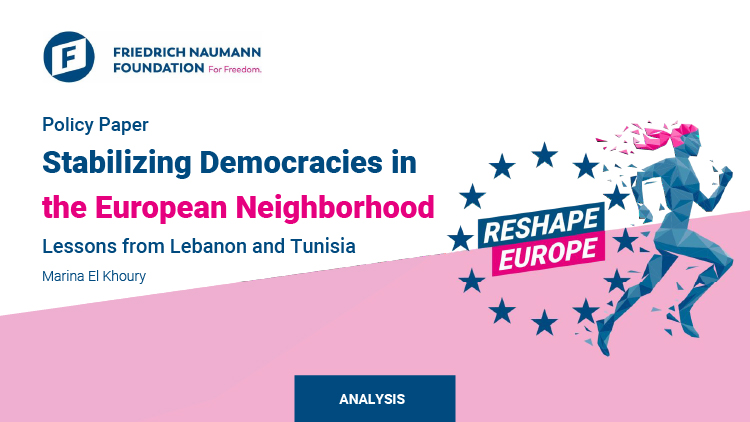Policy Paper
Stabilizing Democracies in the European Neighborhood Lessons from Lebanon and Tunisia

There is much to learn from the recent experiences with democracy support in countries like Tunisia and Lebanon. While their contexts largely differ, the intentions and interests of European partners were similar: help enable and foster a democratic culture that can transform power structures and their institutions into a durable democratic system based on the rule of law and good governance. However, not only have conditions been intractable in that endeavor, but similar patterns of undermining democratic principles and processes are now being displayed everywhere, including European countries.
Given the form and pattern of populist attitudes that have spread around the world in the past few years, democrats have often found themselves stuck in a reactive loop, unable to lead in public debates and to convince illiberal loyalists of joining them. This defensiveness hindered their ability to escape from this trap or coalesce around a common strategy. Moving away from traditional knowledge transfer and capacity development mechanisms in favor of agenda-setting and pragmatic engagement initiatives is thus the core of the recommendations for democracy support actors.
There were additional challenges posed by the form of engagement and synergies, between social movements, NGOs, and political parties. In multiple instances, organizations as well as the public were mobilized yet lacked the proper organizing drive to face strong backsliding and attacks on democratic processes and freedoms. Supporting non-political actors fell short of fostering sustainable political engagement and solutions and may have had a counter-productive effect of diverting the energy of activists away from the political decision-making field. Recommendations include the need for improved coherence of partnerships and focus on value-driven alliances and networks.
The sense that democracy has not delivered, or will not deliver, is widespread. Whether in terms of economic justice and opportunity, personal rights, or even functioning institutions, the disillusionment of many people conceals opportunities that were missed. Recommendations center around the necessity to safeguard freedoms, inclusive processes, and spaces, while integrating a political economy analysis lens to current and future programming. Reclaiming public narratives by improving the visibility and communication around concrete, achievable, and local endeavors, is essential.
Perceptions around operational shortcomings of cooperation actors and their partners point to a general weakness in planning, monitoring and evaluation, and accountability and learning processes. This also affected the capacity to coordinate and develop contingency plans within the larger democracy support field as the situation further deteriorated. Enhancing the resources that feed into those processes can go a long way in keeping in line with longer-term outcomes.
Lastly, European cooperation actors should be more cognizant of the perceived misalignment with their political and diplomatic leadership and the impact it has on the trust of national allies. Listening to those concerns and addressing them is important. Recommendations focus on finding more equitable forms of cooperation, which include for example parallel track advocacy to relay national partners’ messaging to the European sphere.